
views
Purchasing Supplies
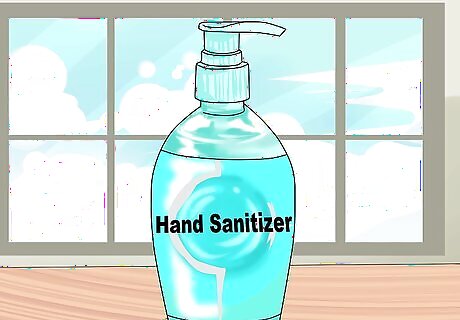
Pick up hand sanitizer. When you’re on the go, hand sanitizer is a great way to fight against germs. Additionally, alcohol-based hand sanitizers are tremendously effective in preventing the spread of the seasonal flu, H1N1, colds, and other viral- and bacterial-based diseases. By stocking up on hand sanitizer, you’re actually helping to prevent the flu for not only yourself but those around you! Always check the label. To be effective, alcohol-based hand sanitizers must contain at least 60 percent alcohol.
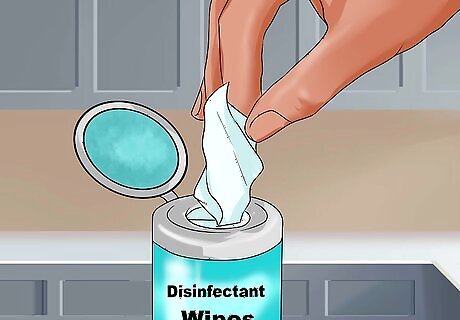
Don't forget disinfectant wipes. Another great item to have on hand during flu season is disinfectant wipes, such as Lysol or Clorox wipes. When purchasing them read the label to make sure it states that EPA has approved the product for effectiveness against influenza A virus. If you’d prefer to use a homemade disinfectant solution, you will need to purchase bleach. The recipe is one tablespoon of bleach per gallon of water. Washing your hands with soap and water is still the most effective way to remove dirt, bacteria, and viruses, but these still work well if you don’t have access to clean water.
Wear a face mask during flu season. Find a face mask that covers your nose and mouth, and wear it whenever you go out in public. Masks help protect you from other people that are sick, and you can prevent getting others sick if you already have the flu.
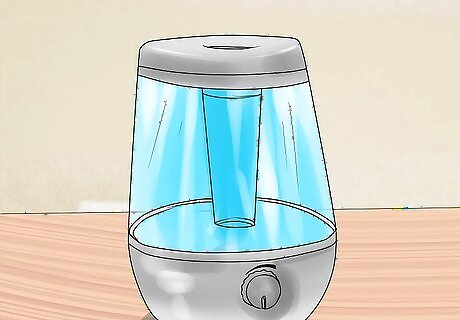
Consider a humidifier or HEPA air filter. You may be surprised to learn that humidifiers, may play an important role in reducing the survival of the flu virus on both surfaces and in the air. You will only need one humidifier or filter per room, so if you’re in a dormitory, discuss this purchase with your roommate before your shopping trip. You’ll want to make sure your roomie is fine with having a humidifier run at night. You may also want to discuss splitting the cost. You will need to keep the humidifier clean to ensure mold and mildew don’t build up, so consider buying a cleaner as well. Make sure you have a flat, solid surface to set it on before making the purchase.
Cleaning Your Space
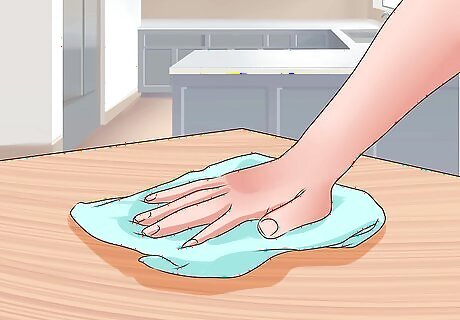
Wipe surfaces with disinfectant cleaner. Colds and flu are caused by viruses, which can easily pass from person to person, or from surface to person, so make sure you hit all of the hard surfaces in your space. This includes everything from the desk and chairs, to trash cans and light switches. Don’t forget the doorknob! Although it’s not attached to your room, it is attached to you, so remember to wipe down your phone as well. Computers and personal tablets should be disinfected too.

Empty trash cans frequently. There’s nothing more attractive to germs than trash, so be sure to take yours out often. This is particularly important if someone in the room is already sick or has a cold. Consider having one trash can per person, to avoid spreading germs. Don’t forget the gloves. When taking out the trash, you may want to consider wearing plastic gloves so that your hands don’t come in direct contact with the can. Regardless, be sure to wash your hands afterward.
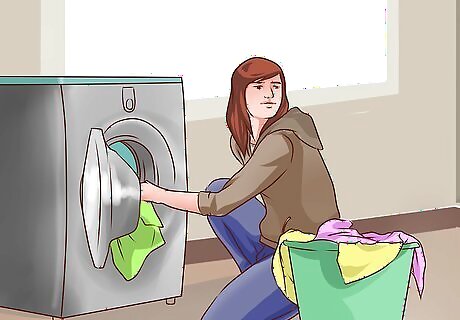
Wash your clothes each time after you wear them in public. Flu season is not the time to recycle your clothes. Instead of leaving your jeans on the floor for another day, put them directly into the laundry basket. Change into different clothes whenever you get home. Be sure to use warm water and soap when cleaning your clothes. Always check the label first, as some clothes will shrink if washed in warm water.
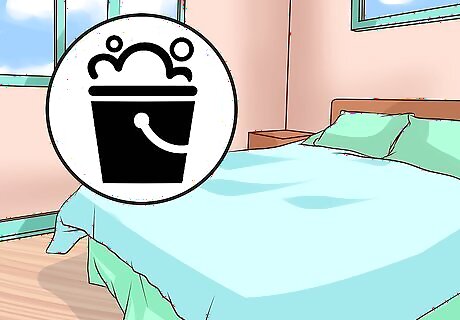
Keep bedding clean. Similar to washing your clothes frequently, you also need to ensure your bedding is clean. Most flu viruses can live one to two days on nonporous surfaces, and eight to 12 hours on porous surfaces. You don’t need to wash your bedding every day, but do try to clean them at least once a week. If you sit on your bed to study, after coming back from classes, you may want to wash them every couple of days instead.
Taking Preventative Measures

Get a flu vaccination. While it may not be mandatory at your institution, some feel the flu shot or nasal spray vaccination should be more than just an option. The vaccination can keep you from getting sick from the flu. Protecting yourself from flu also protects the people around you who are more vulnerable to serious flu illness. Even if you’re not someone who gets sick frequently, think of those around you. Consider the health and safety of your roommates or classmates when making a decision regarding the flu shot. Cost doesn’t necessarily need to be a factor in your decision. Many colleges make getting vaccinated easier by offering flu clinics on campus with free or low-cost vaccines. If you have a severe allergy to one of the ingredients in the vaccine, you should talk to your doctor before getting vaccinated — you may be unable to get the shot. Ingredients may include gelatin, antibiotics, or eggs. Different flu shots are approved for people of different ages. It’s still always best to check with your parents or guardians first before getting the flu shot. The flu vaccine is an important step toward preventing the flu, but it does not mean you definitely won't get sick. The effectiveness of the flu vaccine has been estimated to be somewhere around 10–60%. Even if you get sick, the vaccine may reduce the severity of your symptoms.
Avoid large crowds or close interactions as much as possible. It’s a lot easier to catch and spread the flu virus when you’re surrounded by other people. When you can, reach out over the phone, through emails, or with text messages when you communicate with others. If you need to meet someone in person, find somewhere that has good ventilation and try to stay about 6 feet (1.8 m) apart.
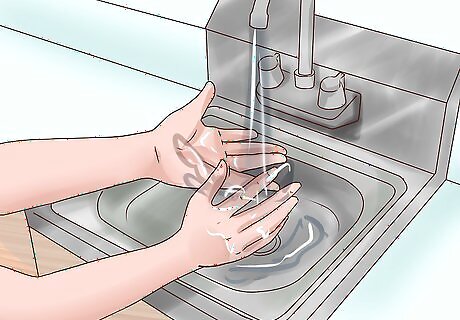
Wash your hands frequently. The flu vaccine is the best way to prevent flu, but the next best thing is good hand hygiene. Prevent the spreading of germs by washing your hands with soap and water for at least 15–20 seconds. Do this several times a day and, though it should go without saying, after you use the bathroom. If you’re in a situation where you can’t wash your hands with soap and water, make good use of that hand sanitizer you purchased. Sing a short song while washing your hands. This will get you in the habit of washing your hands for the appropriate amount of time.
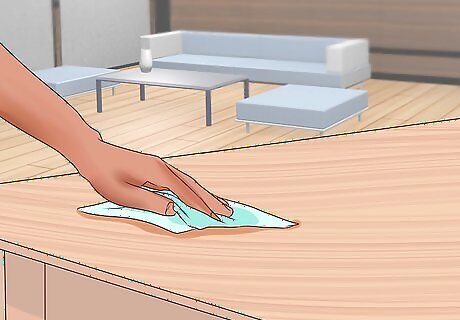
Clean shared spaces with disinfectant wipes. You may have already wiped down your own space, but don’t forget to have your wipes on hand when you’re in a shared space. When someone is sick in an office, it takes only four hours (!) for surfaces like coffee pot handles, copy-machine buttons, and the fridge door to show traces of infectious virus. The same is true at universities, so be sure to keep this in mind at the gym, in your classes, and in the cafeteria.
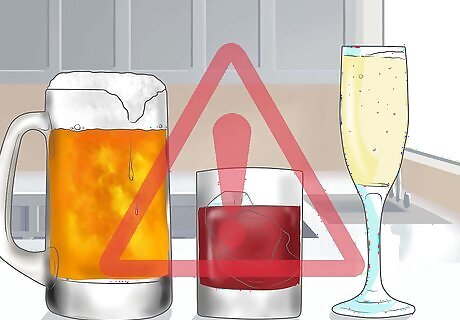
Avoid alcohol in excess. You may want to skip happy hour during flu season primarily because alcohol, interferes with sleep quality and getting rest is crucial to maintaining good health. A glass of wine or a beer shouldn’t interfere with your sleep, just watch that you’re not overdoing it! If you are drinking alcohol at a party, don’t share drinks or taste your friends’ beverage. Make sure to label your cup in a group setting as well.

Steer clear of your face. No matter how clean they may be, remember this: Hands are veritable germ factories, so keep them away from your nose and mouth.

Consider the type of food you’re eating. In keeping with the theme of steering clear of your face, you may want to reconsider certain foods during flu season. Sandwiches, for example, require you to use your hands, which then come directly in contact with your mouth. Consider eating foods, which make use of utensils, such as soup and pasta. Be aware that utensils in school cafeterias are another potential source of germs, so if the option is available, you may want to rely on plastic utensils instead.
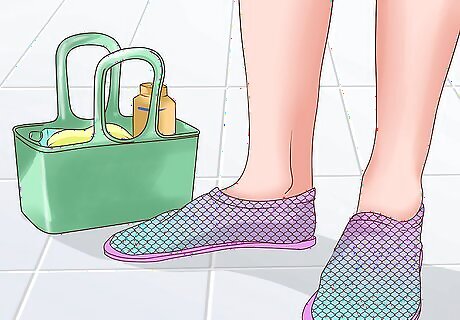
Don't forget your shower shoes and caddy. Given that germs can live for up to a few days on hard surfaces, be sure you remember to wear shower shoes and to bring your own shower caddy, when using communal showers. True, the floors in public showers and locker rooms usually are cleaned with strong detergents that eliminate most germs—but how frequently and thoroughly they are cleaned can vary greatly from establishment to establishment. Carrying your shower caddy back and forth from your room, as opposed to leaving it in the bathroom, will help to further prevent germs from finding their way to you. Don't wear your shower shoes around your room when you're done showering. Leave them by the door, so that you're not bringing the germs in.

Exercise and eat a healthy diet. Aerobic exercise is any activity that gets your heart pumping. It helps increase your body's natural virus-killing cells, so don’t skip the gym! Do bring your hand sanitizer and wipes with you if you’re using the campus gym. Consider outdoor activities, such as running or walking, if you want to avoid germs at the gym. Enjoy foods that are rich in nutrients, such as bone broth, lean proteins, vegetables, and fruit.
Wash your face or blow your nose if you think you’ve been exposed to the flu. If you’re worried you ran into someone who has the flu, try to clean your face or take a shower to clean yourself off as soon as you can. If you don’t have the time to do that, at least try to blow your nose or gargle some water to help flush out any viruses or bacteria.
Doing Damage Control

Get plenty of rest. Despite your best efforts, you may still come down with the flu while at school. Although you may be under a great deal of stress, plan accordingly so that you can get a full night’s rest. If you can manage it, stay home and sleep. The best information we have says complete bed rest is best.

Drink lots of clear fluids. While water is the purest clear liquid that exists and can help people rehydrate during a bout of stomach flu, consider making yourself a cup of tea as well. Make sure to drink decaffeinated tea only and try to add lemon and honey if possible, as lemon thins mucus, and honey is antibacterial. Sports drinks are another option but sip them slowly, as the high sugar content may not react well to your stomach.

Consider nasal rinses or saline drops to flush out viruses. Some people swear by nasal rinses as a means for helping to ease colds/flu. If you feel inclined to try this method, consider an in-home recipe: Mix 3 teaspoons iodide-free salt and 1 teaspoon baking soda. Add 1 teaspoon of this mixture to 1 cup distilled or cooled boiled water. You can use either a syringe, squeeze bottle, or neti pot when doing the rinse. The basic technique with all the devices is the same, so choosing a system is largely a matter of personal preference.




















Comments
0 comment